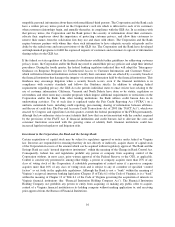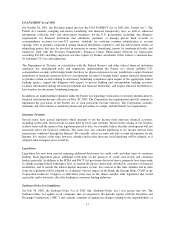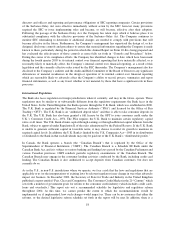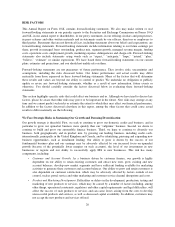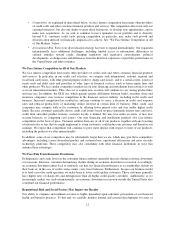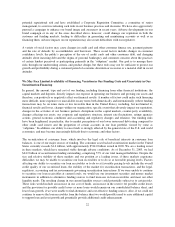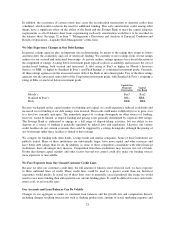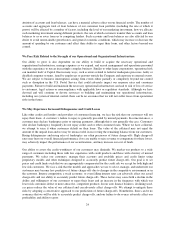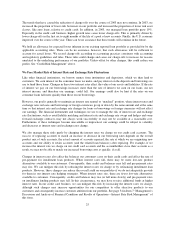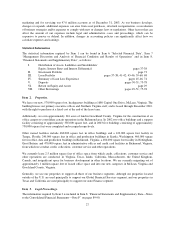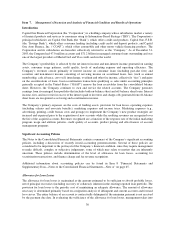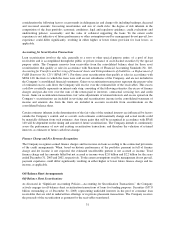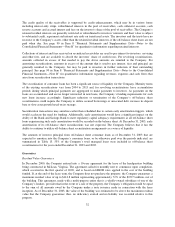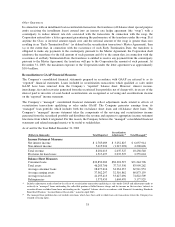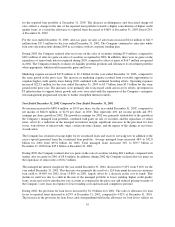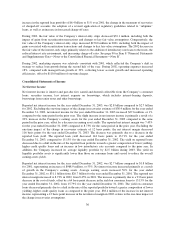Capital One 2003 Annual Report Download - page 44
Download and view the complete annual report
Please find page 44 of the 2003 Capital One annual report below. You can navigate through the pages in the report by either clicking on the pages listed below, or by using the keyword search tool below to find specific information within the annual report.We Face the Risk of a Complex and Changing Regulatory and Legal Environment
Due to our significant reliance on certain contractual relationships, including our funding providers, as well as
our unique corporate structure and heavily regulated industry, we face a risk of loss due to legal contracts,
aspects of or changes in our legal structure, and changes in laws and regulations. We also are subject to an array
of banking, consumer lending and deposit laws and regulations that apply to almost every element of our
business. Failure to comply with these laws and regulations could result in financial, structural and operational
penalties, including receivership. In addition, efforts to comply with these laws and regulations may increase our
costs and/or limit our ability to pursue certain business opportunities. See “Supervision and Regulation” above.
Federal and state laws and rules, as well as accounting rules and rules to which we are subject in foreign
jurisdictions in which we conduct business, significantly limit the types of activities in which we may engage.
For example, federal and state consumer protection laws and rules, and laws and rules of foreign jurisdictions
where we conduct business, limit the manner in which we may offer and extend credit. From time to time, the
U.S. Congress, the states and foreign governments consider changing these laws and may enact new laws or
amend existing laws to regulate further the consumer lending industry. Such new laws or rules could limit the
amount of interest or fees we can charge, restrict our ability to collect on account balances, or materially affect us
or the banking or credit card industries in some other manner. Additional federal, state and foreign consumer
protection legislation also could seek to expand the privacy protections afforded to customers of financial
institutions and restrict our ability to share or receive customer information.
The laws governing bankruptcy and debtor relief, in the U.S. or in foreign jurisdictions in which we conduct
business, also could change, making it more expensive or more difficult for us to collect from our customers.
Congress has recently considered, and the House of Representatives has passed, legislation that would change the
existing federal bankruptcy laws. One intended purpose of this legislation is to increase the collectibility of
unsecured debt; however, it is not clear whether or in what form Congress may adopt this legislation and we
cannot predict how the final version of this legislation may affect us, if passed into law.
In addition, banking regulators possess broad discretion to issue or revise regulations, or to issue guidance, which
may significantly impact us. In 2001, regulators restricted the ability of two of our competitors to provide further
credit to higher risk customers due principally to supervisory concerns over rising charge-off rates and capital
adequacy. We cannot, however, predict whether and how any new guidelines issued or other regulatory actions
taken by the banking regulators will be applied to the Bank or the Savings Bank or the resulting effect on the
Corporation, the Bank or the Savings Bank. In addition, certain state and federal regulators are considering or
have approved rules affecting certain practices of “subprime” mortgage lenders. There can also be no assurance
that these regulators will not also consider or approve additional rules with respect to “subprime” credit card
lending or, if so, how such rules would be applied to or affect the Corporation, the Bank or the Savings Bank.
Furthermore, various federal and state agencies and standard-setting bodies may from time to time consider
changes to accounting rules or standards that could impact our business practices or funding transactions.
In addition, existing laws and rules in the U.S., at the state level, and in the foreign jurisdictions in which we
conduct operations, are complex. If we fail to comply with them, we may not be able to collect our loans in full,
or we might be required to pay damages or penalties to our customers. For these reasons, new or changes in
existing laws or rules could hurt our profits.
Fluctuations in Our Expenses and Other Costs May Hurt Our Financial Results
Our expenses and other costs, such as human resources and marketing expenses, directly affect our earnings
results. Many factors can influence the amount of our expenses, as well as how quickly they grow. For example,
further increases in postal rates or termination of our negotiated service arrangement with the United States
Postal Service could raise our costs for postal service, which is a significant component of our expenses for
26


